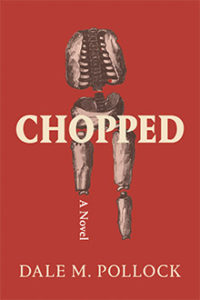By Karen McCarraher
Murder, mayhem, and mystery—this book has it all! Chopped is based on the actual events happening in Boston in 1850. In late 1849, Dr. Parkman, a miserable, miserly person sets out to collect all his rents for the month—and he is never seen again. An investigation reveals that Dr. Parkman was last seen entering the Harvard Medical College around 1 p.m. No one saw him leave.

The investigation soon settled on Dr. John Webster, a professor of chemistry at Harvard. On a tip from the janitor, Ephraim Littlefield, Dr. Webster’s rooms were searched and a grisly discovery was made in his privy. Numerous body parts were found hanging from meat hooks. A chest with internal organs was also discovered in the chemistry lab. Dr. James Stone, an anatomist, was called in to examine the body parts to determine if they were indeed from Dr. Parkman. Professor Webster was arrested and a trial date was set.
Now James had been studying phonography, a system of phonetic marks to represent the sounds of human language (an early form of court reporting). James decided he would take down the actual words said in the courtroom and create a book that would be published within two weeks of the end of the trial. Everyone would then be able to read for themselves what actually went on in the courtroom. James hired a young Irish girl, Ellen O’Keefe, to help with the transcription. She, in turn, hired seven young women to do the actual writing. They would work in turns as each one’s hands and fingers tired, another would take up the transcription. The Boston elite were strenuously against this and warned James not to proceed with his idea or he would be ostracized by Boston society.
Nevertheless, James proceeded with his idea. After court adjourned each day, he met with his transcribers and they worked late into the evening to get everything on paper. Because of the proximity, the working hours, and the fact that Ellen O’Keefe was very beautiful, James began to fall in love with Ellen. Of course, In 1850 Boston, this was prohibitive. The prosecution provided character witnesses and a lot of rhetoric, but no real evidence. All was circumstantial. There was no blood, no weapon, no witnesses and even the body was questionable. However, despite all this, Professor Webster was found guilty and sentenced to hang.
Certain details of the trial nagged at James. Could a person be found guilty with no actual evidence? He tried bringing up these questions to the prosecutor and to the judge but no one would listen. James wondered why Professor Webster had nothing to say in his own defense. But James had his book published and it was a huge success. Requests for copies came from all over the world.
What did Professor Webster reveal to James in his last interview with him? And how about Ellen O’Keefe? Were she and James able to finalize their relationship? There are more interesting stories in the remainder of this book.
This book was meticulously researched based on the papers left by the author’s long dead relative. Sometimes it was difficult to determine who was “speaking” in that there were three lives (and the fourth of the author) being described. Historically, it was correct and it certainly was worth reading.
Dale M. Pollock is a writer, lecturer, film producer, and cinema professor. He lives with his wife, Suzie, in Winston-Salem, N.C.
Chopped is published by: Shadowbrook Publishing and available at www.amazon.com.